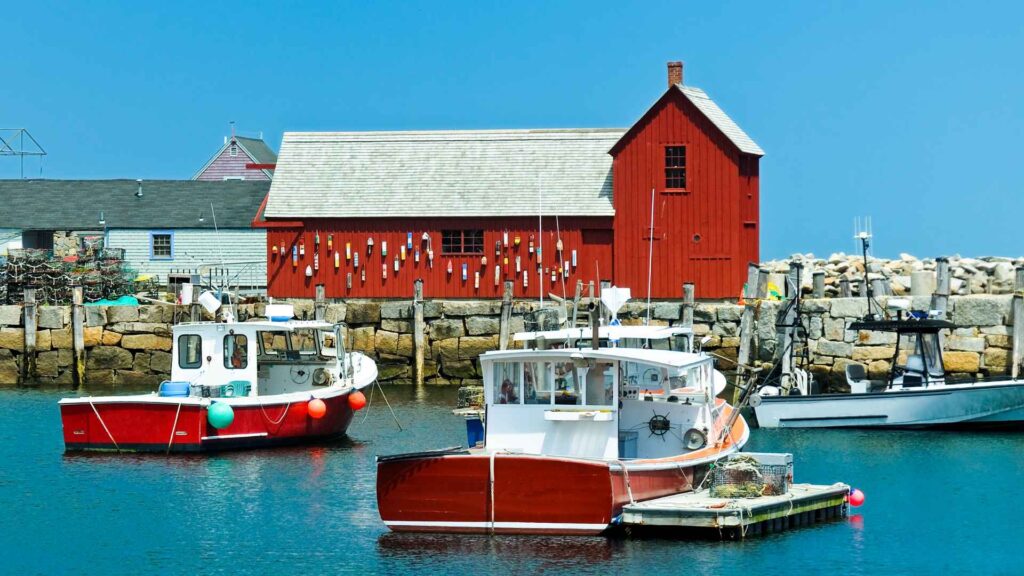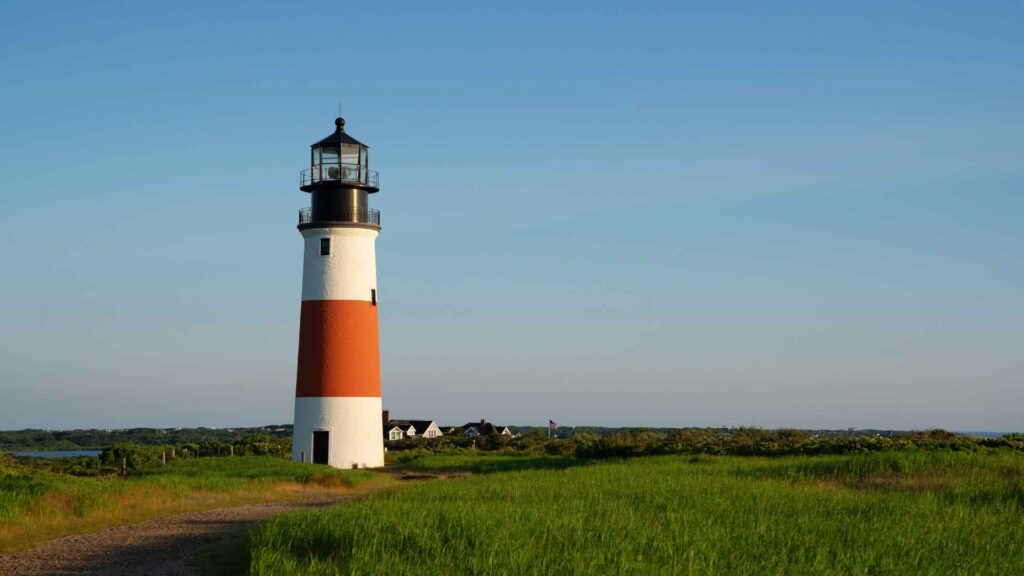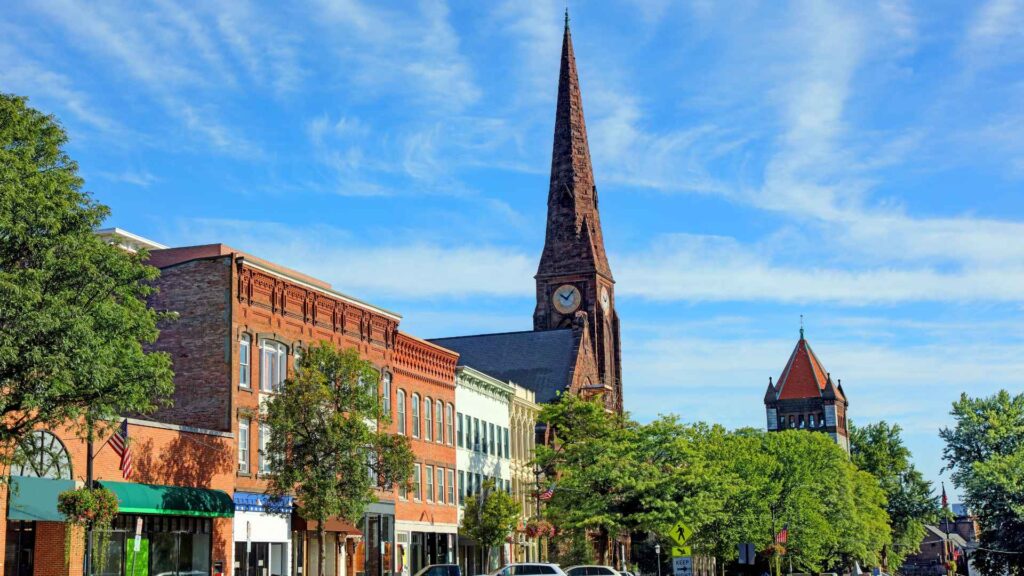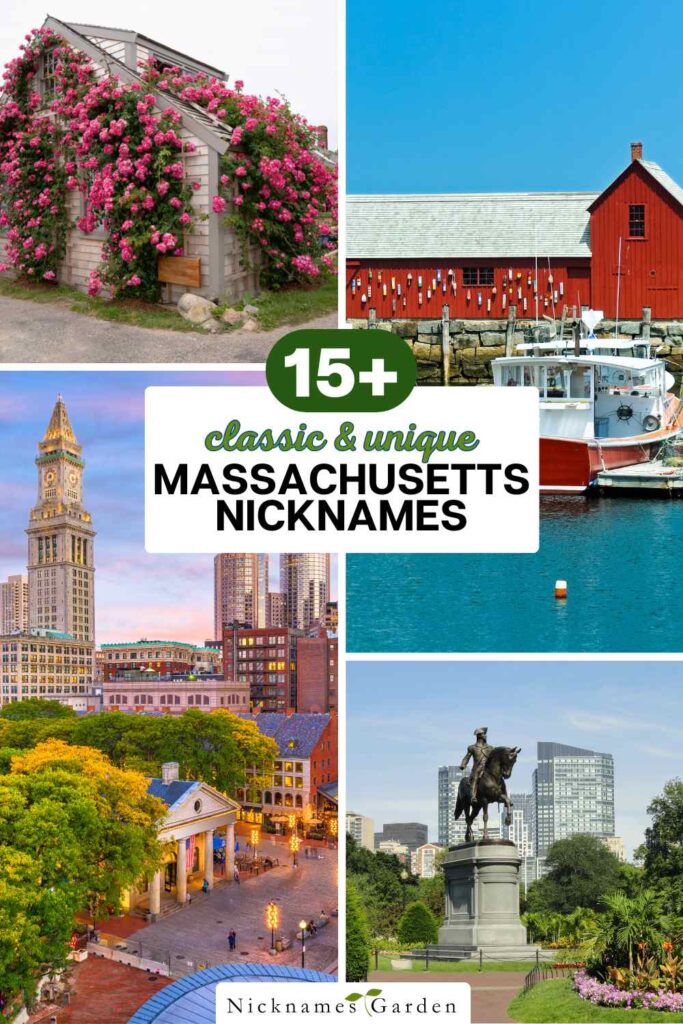Massachusetts, rich in history and culture, boasts a variety of nicknames that reflect its unique identity.
From “The Bay State” to “The Cradle of Liberty,” discover the origins and meanings behind these monikers that celebrate the state’s heritage and influence.
Historical Nicknames
The Bay State
Origin:
- The nickname “The Bay State” originates from the Massachusetts Bay Colony.
- One of the earliest English settlements in North America, founded in the early 17th century.
- Established by Puritans who sought religious freedom and economic opportunities.
Meaning:
- Reflects the historical significance of the Massachusetts Bay Colony.
- Highlights the state’s early beginnings.
- Bay: Refers to the numerous bays along the state’s coastline, emphasizing Massachusetts’ connection to the Atlantic Ocean and its maritime heritage.
- Continues to symbolize the state’s rich history and its role in the early colonization of America.
The Old Colony State
Origin:
- Refers to the Plymouth Colony, established by the Pilgrims in 1620.
- One of the first successful colonial endeavors by the English in North America.
- Founding is a significant event in American history.
Meaning:
- Underscores the importance of the Plymouth Colony in the history of Massachusetts and the United States.
- Old Colony: Conveys a sense of antiquity and historical depth.
- Emphasizes the state’s long-standing presence.
- Highlights its foundational role in the early days of American settlement.
- Serves as a reminder of the Pilgrims’ perseverance and the colony’s contribution to the development of the nation.
The Pilgrim State
Origin:
- Derived from the Pilgrims, the group of English settlers who arrived on the Mayflower.
- Established the Plymouth Colony in 1620.
- Celebrated for their role in American history, particularly for their quest for religious freedom and their role in the first Thanksgiving.
Meaning:
- Highlights the significance of the Pilgrims in Massachusetts’ history.
- Pilgrim: Evokes images of the early settlers’ journey, their challenges, and their contributions to the foundations of the United States.
- Honors Massachusetts’ early inhabitants and their impact on the nation’s cultural and historical narrative.

Geographical and Natural Nicknames
The Baked Bean State
Origin: The nickname “The Baked Bean State” comes from Massachusetts’ long-standing tradition of preparing baked beans. This dish, often sweetened with molasses, became particularly associated with Boston during colonial times.
Meaning:
- Culinary Heritage: Baked beans were a staple in early New England cuisine, particularly on Saturdays when they were baked slowly in a pot.
- Cultural Significance: This nickname highlights the state’s culinary history and Boston’s reputation for baked beans, often humorously referred to as “Beantown.”
The Codfish State
Origin: “The Codfish State” traces its roots to Massachusetts’ thriving fishing industry, particularly during the colonial era. Cod was a major export and a crucial part of the state’s economy.
Meaning:
- Maritime Heritage: Cod fishing was central to Massachusetts’ economic development and helped establish the state’s prominence in the fishing industry.
- Symbolic Importance: The codfish symbolizes the state’s reliance on the sea and its natural resources. It is even represented in the Massachusetts State House, where a wooden codfish, known as the “Sacred Cod,” hangs in the House of Representatives chamber.
The Spirit of America
Origin: This modern nickname is used as the state’s official slogan, prominently displayed on Massachusetts license plates since 1986.
Meaning:
- Patriotism: “The Spirit of America” reflects Massachusetts’ rich history of contributing to the American Revolution and the founding of the nation.
- State Pride: This slogan conveys a sense of pride in the state’s historical and cultural achievements, embodying the values and spirit that have shaped America.
The Cradle of Liberty
Origin: “The Cradle of Liberty” is a nickname that highlights Massachusetts’ pivotal role in the American Revolution. Key events such as the Boston Tea Party and the battles of Lexington and Concord took place here.
Meaning:
- Revolutionary History: This nickname underscores the state’s significant contributions to the fight for American independence.
- Freedom and Democracy: Massachusetts is celebrated as a birthplace of American liberty, where early patriots fought for freedom and laid the foundations for the nation’s democratic principles.
The Athens of America
Origin: Boston, Massachusetts, earned the nickname “The Athens of America” in the early 19th century due to its intellectual and cultural achievements. The term was popularized by the poet Oliver Wendell Holmes.
Meaning:
- Educational Excellence: Boston is home to prestigious universities such as Harvard and MIT, making it a center of learning and innovation.
- Cultural Hub: The nickname reflects the city’s rich cultural offerings, including museums, libraries, and theaters, drawing a parallel to ancient Athens’ role in classical antiquity.

Cultural and Sociopolitical Nicknames
The Spirit of America
Origin: “The Spirit of America” is the official state slogan of Massachusetts, adopted in 1986. It appears on the state’s license plates and other official materials.
Meaning:
- Patriotic Significance: This nickname reflects Massachusetts’ crucial role in American history, particularly during the American Revolution. The state is celebrated for its contributions to the founding of the United States and its embodiment of American ideals.
- Cultural Pride: The slogan emphasizes the state’s ongoing influence and its embodiment of the spirit that has shaped the nation’s identity and values.
The Cradle of Liberty
Origin: “The Cradle of Liberty” is a nickname that honors Massachusetts’ key role in the American Revolution. Boston, in particular, was a hotbed of revolutionary activity, with events like the Boston Tea Party and the Boston Massacre.
Meaning:
- Historical Importance: This nickname highlights Massachusetts’ significant contributions to the struggle for American independence. It commemorates the state’s early patriots who fought for freedom and laid the foundations for the nation’s democratic principles.
- Symbol of Freedom: “The Cradle of Liberty” represents Massachusetts as a birthplace of American liberty, underscoring its enduring legacy in the fight for freedom and justice.
The Athens of America
Origin: The nickname “The Athens of America” was coined by Oliver Wendell Holmes in the early 19th century. It reflects Boston’s reputation as a center of learning and culture, akin to the ancient city of Athens.
Meaning:
- Educational Prestige: Boston is home to some of the world’s most prestigious educational institutions, including Harvard University and the Massachusetts Institute of Technology (MIT). This nickname underscores the city’s status as a hub of intellectual and academic excellence.
- Cultural Richness: The comparison to Athens highlights Boston’s rich cultural heritage, with its numerous museums, libraries, theaters, and historical sites. It reflects the city’s role as a center for the arts, literature, and philosophical thought.
Taxachusetts
Origin: The nickname “Taxachusetts” emerged in the late 20th century as a satirical reference to Massachusetts’ tax policies, which were perceived as high compared to other states.
Meaning:
- Public Perception: This nickname reflects the state’s reputation for having higher taxes and a larger government presence. It often surfaces in political discussions and debates about taxation and fiscal policy.
- Economic Identity: While the term is sometimes used pejoratively, it also points to Massachusetts’ commitment to providing comprehensive public services and infrastructure, funded through state taxes.
The Puritan State
Origin: “The Puritan State” refers to the early Puritan settlers who established the Massachusetts Bay Colony in the 17th century. These settlers sought religious freedom and aimed to create a “city upon a hill,” as envisioned by John Winthrop.
Meaning:
- Religious Heritage: This nickname underscores the profound influence of Puritan values and beliefs on the state’s early development. The Puritans’ emphasis on hard work, education, and community shaped Massachusetts’ cultural and social fabric.
- Historical Legacy: The term “Puritan State” highlights the lasting impact of these early settlers on Massachusetts’ identity, from its educational institutions to its legal and moral frameworks.

Modern and Popular Nicknames
The Bay State (Revisited)
Popular Usage and Modern Context:
- Continued Relevance: Despite its historical origins, “The Bay State” remains a popular and widely recognized nickname for Massachusetts. It is used in official contexts, tourism promotions, and everyday conversation.
- Modern Symbolism: Today, “The Bay State” not only recalls the early colonial period but also symbolizes Massachusetts’ ongoing connection to the Atlantic Ocean, its beautiful coastline, and its vibrant maritime economy.
Taxachusetts
Origin: This modern nickname emerged in the late 20th century as a critique of Massachusetts’ tax policies, which were perceived to be higher than those of other states.
Meaning:
- Public Perception: “Taxachusetts” reflects a popular view that Massachusetts has relatively high taxes and a substantial government presence. It is often used in political discourse and debates about state fiscal policy.
- Economic Identity: While sometimes used pejoratively, the nickname also points to Massachusetts’ investment in public services, education, infrastructure, and healthcare, which are funded through state taxes.
The Puritan State
Origin: This nickname refers to the early Puritan settlers who established the Massachusetts Bay Colony in the 17th century. Their aim was to create a model society based on their religious beliefs and values.
Meaning:
- Religious Heritage: “The Puritan State” underscores the influence of Puritan values and beliefs on Massachusetts’ development. The Puritans’ focus on hard work, education, and community significantly shaped the state’s cultural and social fabric.
- Historical Legacy: This nickname highlights the lasting impact of the Puritans on Massachusetts’ identity, from its educational institutions to its legal and moral frameworks. It serves as a reminder of the state’s foundational values and historical roots.

Regional Nicknames
Beantown (Boston)
Origin: The nickname “Beantown” originates from Boston‘s long-standing tradition of preparing baked beans, often sweetened with molasses. This culinary tradition dates back to colonial times.
Meaning:
- Culinary Heritage: “Beantown” highlights Boston’s reputation for baked beans, a staple in early New England cuisine. The nickname reflects the city’s unique culinary history and cultural identity.
- Cultural Significance: Beyond its culinary roots, “Beantown” has become a beloved moniker for Boston, evoking a sense of local pride and tradition.
The Hub (Boston)
Origin: “The Hub” is short for “The Hub of the Universe,” a term coined by Oliver Wendell Holmes in the 19th century. It reflects Boston’s importance as a center of activity and influence.
Meaning:
- Cultural and Economic Center: “The Hub” signifies Boston’s central role in New England and the broader United States. The nickname underscores the city’s cultural, economic, and intellectual significance.
- Historical Influence: The term also reflects Boston’s historical importance, particularly during the American Revolution and the early years of the United States.
The City of Champions (Boston)
Origin: “The City of Champions” refers to Boston’s impressive record in professional sports. The city is home to several successful sports teams, including the Boston Red Sox, New England Patriots, Boston Celtics, and Boston Bruins.
Meaning:
- Sports Excellence: This nickname celebrates Boston’s success in various sports, highlighting the city’s numerous championships and its passionate sports culture.
- Pride and Identity: “The City of Champions” reflects the pride Bostonians take in their sports teams and the sense of community and identity that sports bring to the city.
Unofficial and Quirky Nicknames
Titletown
Origin: Similar to “The City of Champions,” “Titletown” is a nickname used for cities like Boston that have achieved significant success in professional sports.
Meaning:
- Celebration of Success: “Titletown” underscores the city’s impressive sports achievements and the pride residents take in their teams’ victories.
- Community Spirit: The nickname reflects the strong sense of community and shared identity fostered by Boston’s sports culture.
The Land of Pilgrims
Origin: “The Land of Pilgrims” honors the Pilgrims who settled in Plymouth, Massachusetts, in 1620. These early settlers are celebrated for their role in American history and their quest for religious freedom.
Meaning:
- Historical Significance: This nickname emphasizes Massachusetts’ foundational role in American history and its association with the Pilgrims’ journey and settlement.
- Cultural Heritage: “The Land of Pilgrims” highlights the state’s rich cultural heritage and its continuing celebration of its early settlers.
Yankee Land
Origin: “Yankee Land” refers to Massachusetts’ identity as part of New England and its association with Yankee culture and heritage.
Meaning:
- Regional Identity: This nickname reflects the state’s strong New England identity and its cultural ties to the broader region.
- Historical and Cultural Roots: “Yankee Land” emphasizes Massachusetts’ historical and cultural heritage, including its early settlers, traditions, and values.
Concluding The Best Massachusetts Nicknames
Massachusetts, with its rich tapestry of history, culture, and natural beauty, has earned a multitude of nicknames that reflect its diverse identity.
From “The Bay State” and “The Cradle of Liberty” to “The Spirit of America,” each nickname tells a unique story about the state’s past and present. These monikers celebrate Massachusetts’ pivotal role in American history, its intellectual and cultural contributions, and its vibrant community spirit.
Whether it’s the culinary heritage of “Beantown,” the revolutionary fervor of “The Cradle of Liberty,” or the educational prestige of “The Athens of America,” these nicknames encapsulate the essence of what makes Massachusetts special.
They offer a glimpse into the state’s soul, highlighting the values, achievements, and character that have shaped its legacy.
As you explore Massachusetts, you’ll see these nicknames come to life in the bustling streets of Boston, the serene landscapes of Cape Cod, and the historic sites that dot the state. Each name is a testament to the enduring spirit and pride of the people who call Massachusetts home.
We hope this guide has deepened your understanding and appreciation of Massachusetts’ nicknames. They are more than just labels; they are stories of resilience, innovation, and community.
Whether you’re a resident or a visitor, these nicknames invite you to connect with the state’s rich heritage and discover the many facets of its identity.


